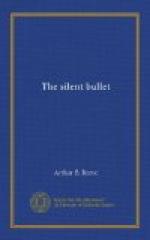“Oh, nothing. I merely thought there might be some hint as to the motives of the robbery,” said Craig. He was fingering one of those desk-calendars which have separate leaves for each day with blank spaces for appointments.
“‘Close deal Poissan,’” he read slowly from one of the entries, as if to himself. “That’s strange. It was the correspondence under the letter ‘P’ that was destroyed at the office, and there is nothing in the letter-file here, either. Who was Poissan?”
Mrs. Morowitch hesitated, either from ignorance or from a desire to evade the question. “A chemist, I think,” she said doubtfully. “My husband had some dealings with him—some discovery he was going to buy. I don’t know anything about it. I thought the deal was off.”
“The deal?”
“Really, Mr. Kennedy, you had better ask Mr. Kahan. My husband talked very, little to me about business affairs.”
“But what was the discovery?”
“I don’t know. I only heard Mr. Morowitch and Mr. Kahan refer to some deal about a discovery regarding diamonds.”
“Then Mr. Kahan knows about it?”
“I presume so.”
“Thank you, Mrs. Morowitch,” said Kennedy, when it was evident that she either could not or would not add anything to what she had said. “Pardon us for causing all this trouble.”
“No trouble at all,” she replied graciously, though I could see she was intent on every word and motion of Kennedy and Andrews.
Kennedy stopped the car at a drug-store a few blocks away and asked for the business telephone directory. In an instant, under chemists, he put his finger on the name of Poissan—“Henri Poissan, electric furnaces,—William St.,” he read.
“I shall visit him to-morrow morning. Now for the doctor.”
Doctor Thornton was an excellent specimen of the genus physician to the wealthy—polished, cool, suave. One of Mr. Andrews’s men, as I have said, had seen him already, but the interview had been very unsatisfactory. Evidently, however, the doctor had been turning something over in his mind since then and had thought better of it. At any rate, his manner was cordial enough now.
As he closed the doors to his office, he began to pace the floor. “Mr. Andrews,” he said, “I am in some doubt whether I had better tell you or the coroner what I know. There are certain professional secrets that a doctor must, as a duty to his patients, conceal. That is professional ethics. But there are also cases when, as a matter of public policy, a doctor should speak out.”
He stopped and faced us.
“I don’t mind telling you that I dislike the publicity that would attend any statement I might make to the coroner.”
“Exactly,” said Andrews. “I appreciate your position exactly. Your other patients would not care to see you involved in a scandal—or at least you would not care to have them see you so involved, with all the newspaper notoriety such a thing brings.”




